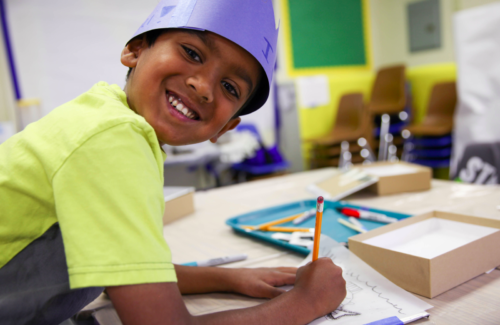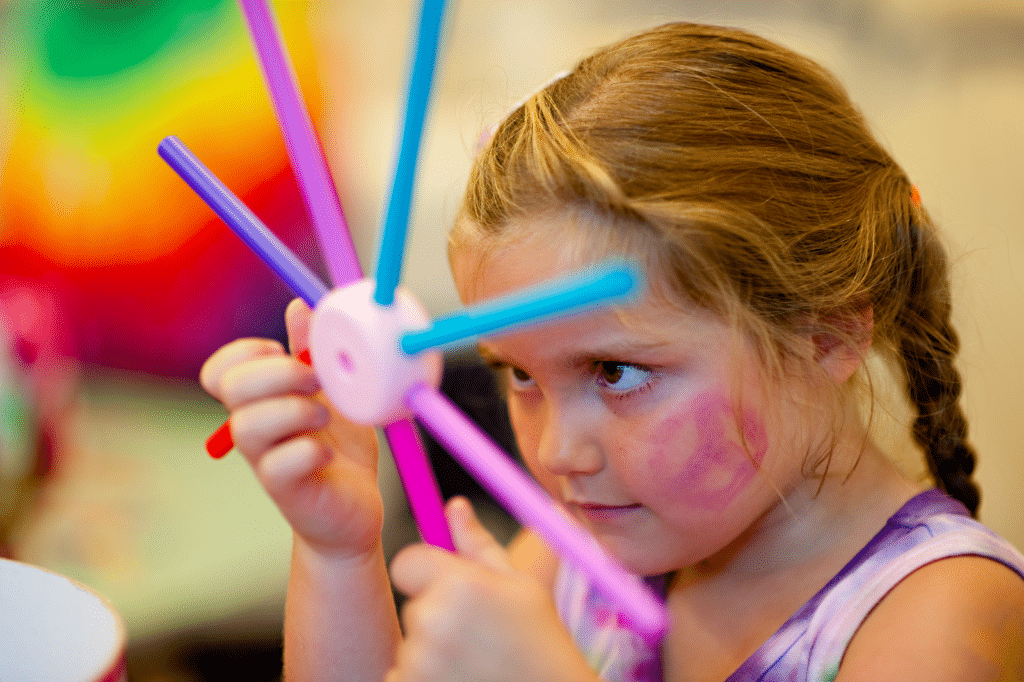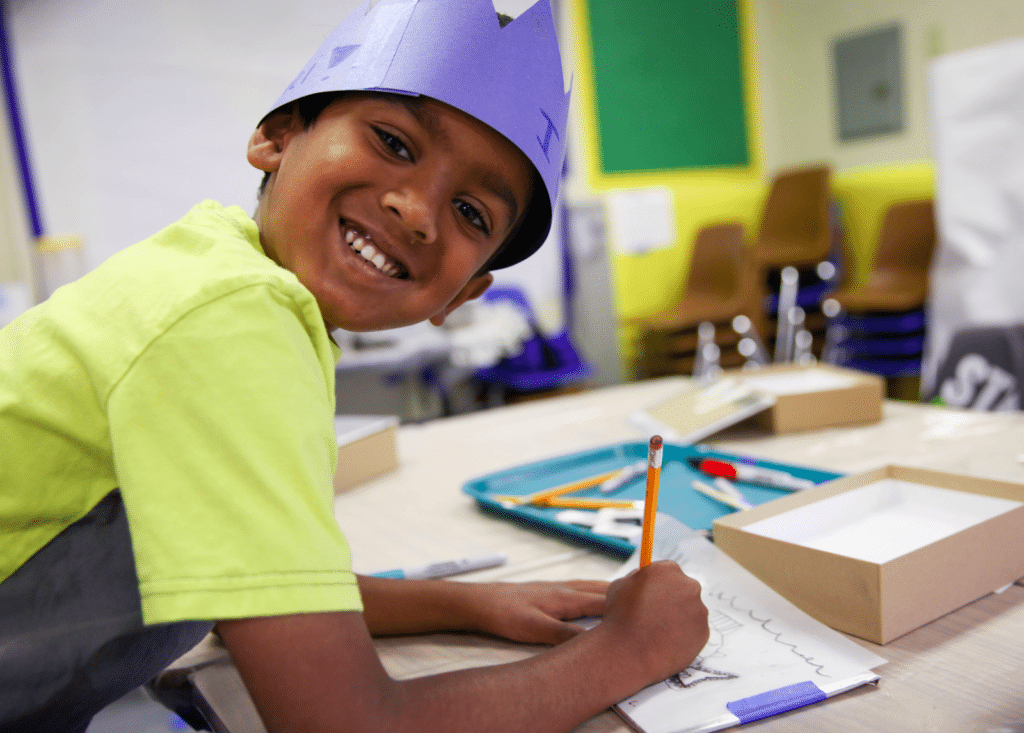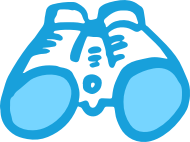Behind The Scenes of Galileo’s Makers Workshop

This summer, we’re excited to offer a camp theme that’s going to be a hands-on, hands-down adventure. Our Maker’s Workshop is designed to inspire Pre-K through 5th graders to flex their creativity as they build innovative household items that they can use in their everyday lives. From handmade tents to custom safes to working vacuum cleaners, our expert curriculum developers have been hard at work fine-tuning activities for everyone to enjoy. Curious about what we’ve got planned? Read on for a behind-the-scenes look at this one-of-a-kind camp theme.
UNLEASHING THE INNER ARTIST
The art projects we’ve got planned for Maker’s Workshop are a mix of playful imagination, self-expression, and collaboration. We’ve developed our curriculum with different levels of artistic ability at various stages of childhood in mind, and have exciting projects in store for each age group.

NEBULAS (PRE-K TO KINDERGARTEN)
Our youngest campers—we call them Nebulas—will create three different art projects during the week. The first is a personalized door sign for their room. Campers willdecorate their signs with crayons while learning advanced crayon rubbing and beading techniques. Second, Nebulas will create a custom nighttime t-shirt, testing various dying and stenciling patterns. Finally, they’ll create bedtime buddy dolls inspired by the types of dreams they want to have at night.
At Galileo, we’re all about having fun while challenging ourselves in the process. This week, we’ll challenge our Nebulas to learn new and unique art techniques. For example, in the nighttime t-shirt project, campers will experiment with different non-toxic dyed color combinations to create the exact shade they want to create for their personal t-shirt. At the same time, they’ll work together with their peers and share their dye color with others.
For the bedtime buddy art project, we’ll challenge our Nebulas to think about the dreams they envision for themselves to inspire the design of their doll. We’ve heard everything from “Swimming with dolphins,” to “Touring a candy store.”. Once they have their vision in place, campers will customize their dolls’ outfit, hair, and accessories to represent the dreams they envision.

STARS (1ST – 2ND GRADE)
Star campers will focus on two art projects over the course of five days. They’ll create a night light inspired by their favorite animal and a stool made completely of cardboard that can support their own weight.
Getting ready for bed will be so much more fun when kids have an illuminated lion, tiger, or owl they personally made by hand lighting the way. We start this project by challenging campers to break down complex body parts (like a wing or a tail) into its component shapes. From there, campers design seasonal backgrounds that they can swap out for each season. Summer scenes might include lots of sun and colorful plants, while the winter may feature a snow fort closely guarded by a snowman. The creative possibilities are endless.
Up next, campers will practice building their engineering and creative skills as they build cardboard stools. Campers begin by generating ideas for stamped patterns they might use for the seat of their stool. After collaborating with their peers and thinking about various concepts, they’ll come up with a final design and proudly stamp it on a piece of fabric to create a seat cushion. From there, campers will learn about strong shapes that can support their weight and assemble the top, base, and sides and attach the cushion.

SUPERNOVAS (3RD – 5TH GRADE)
As Camp Galileo’s oldest cohort, Supernovas tackle complex concepts through engaging projects. They’ll focus their creative energy throughout the week on a single art project: custom character clocks.
First, campers will practice being visionary as they imagine a fanciful character that will grace the face of their clock. To get their creative juices flowing, we’ll challenge our campers to brainstorm by mixing and matching different professions, locations, and creatures. At the end of the day, campers will sketch out their character and start contemplating the overall design of their clock.
Over the next few days, the Supernovas will learn about artistic techniques like shading and texture as they paint their clock’s character, background, and numerals. They’ll practice being determined as they assemble their electric clock mechanisms and build them into their clocks. On the final day of camp, Supernovas proudly show off their creations and get to take their ticking time-keepers home.

LET’S GET SILLY & SCIENTIFIC
During science rotations, campers will learn new concepts, testing ideas with others, and have an absolute blast. Just like our art projects, we split our campers into groups so they can explore age-appropriate activities. We can’t wait to see campers roll up their sleeves and beam with pride as they build fishing poles, handcarts, and even vacuum cleaners.

NEBULAS (PRE-K TO KINDERGARTEN)
Our Nebulas start off by building tents in pairs. They’re a lot like the bedsheet forts that your kids like to hang out in at home, except this time, you don’t have to worry about putting couch cushions back in place or refolding all of your blankets afterwards.
Using two chairs, a bedsheet, and horizontal tent poles, our youngest campers will be challenged to create a tent that can hold the weight of the sheet and fit both campers inside at the same time. This project will teach campers about taping techniques and engineering concepts like building strong structural shapes—not to mention collaboration skills.
Next up, Nebulas create fishing poles out of different materials that can catch the largest fish possible. Our staff sets up an obstacle course with plastic fish of different weights for campers to test, evaluate, and redesign their poles. Excited shouts and celebratory high-fives are common occurrences during this activity.
Next, Nebulas tackle a forest-themed adventure all without ever leaving camp. They’ll cross over rivers, crawl through caves, climb over fallen trees, collect precious forest gems, and navigate their way through the course using a compass and a marker for taking notes. They’ll come prepared with adventure belts of their own design, each with plenty of pockets that can hold materials they’ll discover along the way.
Finally, Nebulas will construct basic wood and cardboard handcarts. During this two-day project, campers will assemble the bodies of their carts and add handles. Then they’ll test lifting objects of various weights like water bottles without the box breaking. Once the main design is in place, they’ll add wheels and dividers into the cart, then roll it over heavy terrain to test the cart’s ability to safely transport precious cargo.

STARS (1ST – 2ND GRADE)
Stars will discover the joys of tidying up as they embark upon two projects in their science rotations: grabbers that can pick up a variety of objects and working vacuum cleaners. (Side effects may include a newfound enthusiasm for room-cleaning. You can thank us later.)
The week kicks off with an introduction to hinges and tension so that campers will understand the concepts they’ll use to build their grabbers. By the end of the day, they’ll build something that can pick up a sponge. The next day, we’ll challenge them to attempt picking up larger objects. After learning more about friction, campers will redesign their original prototypes so they can pick up even more things (*cough* *cough* like the dirty socks in their bedrooms *cough*).
By mid-week, they’ll start learning about how circuits work and what makes them run so they can build their vacuum cleaners. In teams, we’ll play a game of “human circuit” where the campers will sit in a circle and pass around balls of “electricity.” Once they have the concept down, they’ll practice wiring a circuit that powers an electric motor, insert it into a cardboard tube, and test their design to find out if it can pick up a coffee filter. The final days of camp are dedicated to making the canister, filters, and nozzle for the vacuum cleaner, with plenty of time built in to test, evaluate, and redesign as necessary so that the vacuums can pick up different types of objects.

SUPERNOVAS (3RD – 5TH GRADE)
Supernovas will turn their scientific minds toward building innovative safes complete with combination locks and alarm systems—perfect for protecting prized possessions from the prying eyes of siblings and friends.
The week starts by assembling the safe box that can only open when it’s tipped at a certain angle. Through a series of testing and evaluating, campers will build straw and dowel attachments to open the safe, putting their newfound knowledge of component isolation to work. Over the next few days, they’ll create combination locks by building lock plates on the inside of their safes and matching them with locks on the outside. They’ll make their safes even tougher to crack by creating personal and unique lock systems made up of matching symmetrical shapes or color patterns.
At the end of the week, Supernovas will create alarm systems using circuits that are wired to buzzers that are activated when the safe lid is open. They’ll practice being visionary as they imagine sneaky ways to misdirect people introducing red herrings like fake locks or designing the outside of their safe to blend in with their surroundings.

—
The art and science projects campers explore at Camp Galileo are pretty cool. But the truly amazing things they build are self-confidence, determination, and the belief that they can turn their ideas into reality. To discover a summer camp location near you, click the button below.

